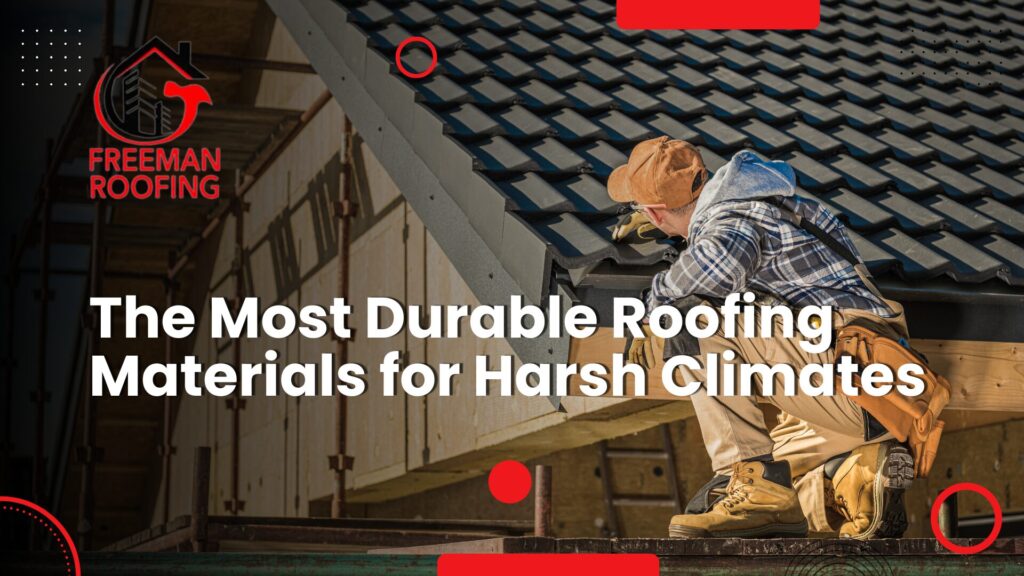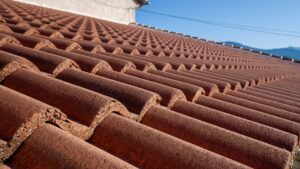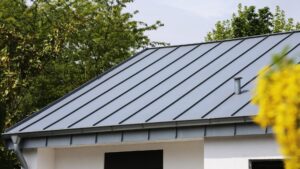The Most Durable Roofing Materials for Harsh Climates

Choosing the right roofing material is vital for protecting your home against harsh weather conditions. Whether it’s heavy rain, high winds, scorching sun, or freezing snow, durable roofing materials can withstand it all. Here’s a guide to the most resilient options for extreme climates and their benefits.
Metal Roofing: Strength and Longevity
Metal roofing is a top choice for harsh climates due to its robustness and long lifespan. This material resists cracking, shrinking, and erosion, making it ideal for areas with heavy snow, strong winds, or extreme heat.
Benefits of Metal Roofing:
- Lasts 50+ years with minimal maintenance
- Fire-resistant and non-combustible
- Reflects heat, keeping homes cooler in hot weather
Slate Roofing: Natural Durability
Slate roofing offers unparalleled durability, often lasting over 100 years. Made from natural stone, it’s highly resistant to extreme temperatures, fire, and moisture.
Why Choose Slate Roofing:
- Withstands both intense heat and cold
- Non-combustible and mold-resistant
- Adds timeless elegance to any home

Clay and Concrete Tiles: Weather-Resistant Beauty
For homes in hot and humid climates, clay and concrete tiles are excellent options. They’re highly durable, fire-resistant, and energy-efficient.
Advantages of Clay and Concrete Tiles:
- Lifespan of 50-100 years
- Provides natural insulation
- Minimal maintenance needed
Asphalt Shingles: Versatile and Cost-Effective
Asphalt shingles, especially architectural or impact-resistant types, are a reliable option for regions with moderate to harsh weather.
Key Features of Asphalt Shingles:
- Affordable and easy to install
- Resistant to moderate wind and hail damage
- Available in a variety of styles and colors
Synthetic Roofing: Durable and Innovative
Synthetic materials, such as polymer composites, are engineered to mimic natural roofing while offering superior strength. These materials are lightweight, eco-friendly, and designed to endure severe weather.
Why Opt for Synthetic Roofing:
- Resists cracking, warping, and impact
- Lightweight and easy to install
- Eco-friendly and long-lasting
Rubber Roofing: Waterproof and Resilient
Rubber roofing is highly effective at preventing leaks and resisting weather damage, making it ideal for flat or low-slope roofs.
Benefits of Rubber Roofing:
- Highly waterproof and impact-resistant
- Flexible and durable
- Cost-effective for long-term use
Factors to Consider When Choosing a Roofing Material
- Weather Resistance: Match the material to your climate’s specific challenges.
- Lifespan: Look for materials that offer longevity with minimal upkeep.
- Energy Efficiency: Choose options that enhance insulation and reduce energy costs.
- Aesthetics: Ensure the material complements your home’s style.
Conclusion
Selecting the right roofing material for harsh climates can protect your home and save you money in the long run. Durable options like metal, slate, and synthetic materials ensure your roof can stand up to extreme conditions. For expert guidance, consult trusted roofing companies in Pensacola to find the best solution for your home.

